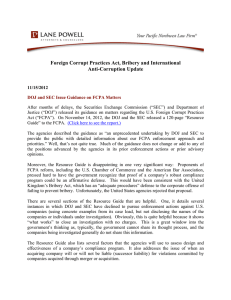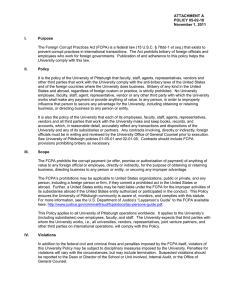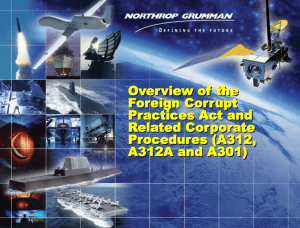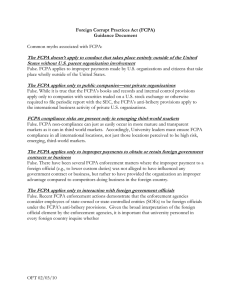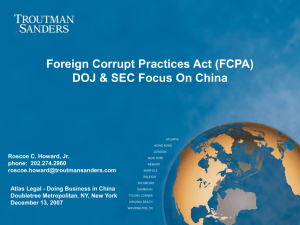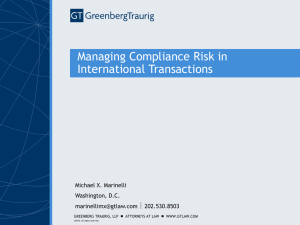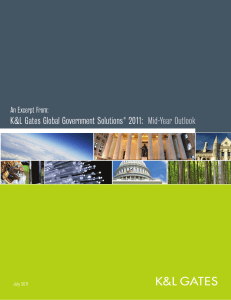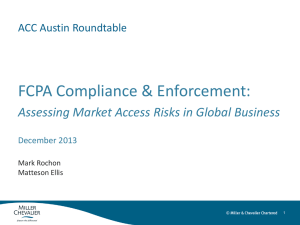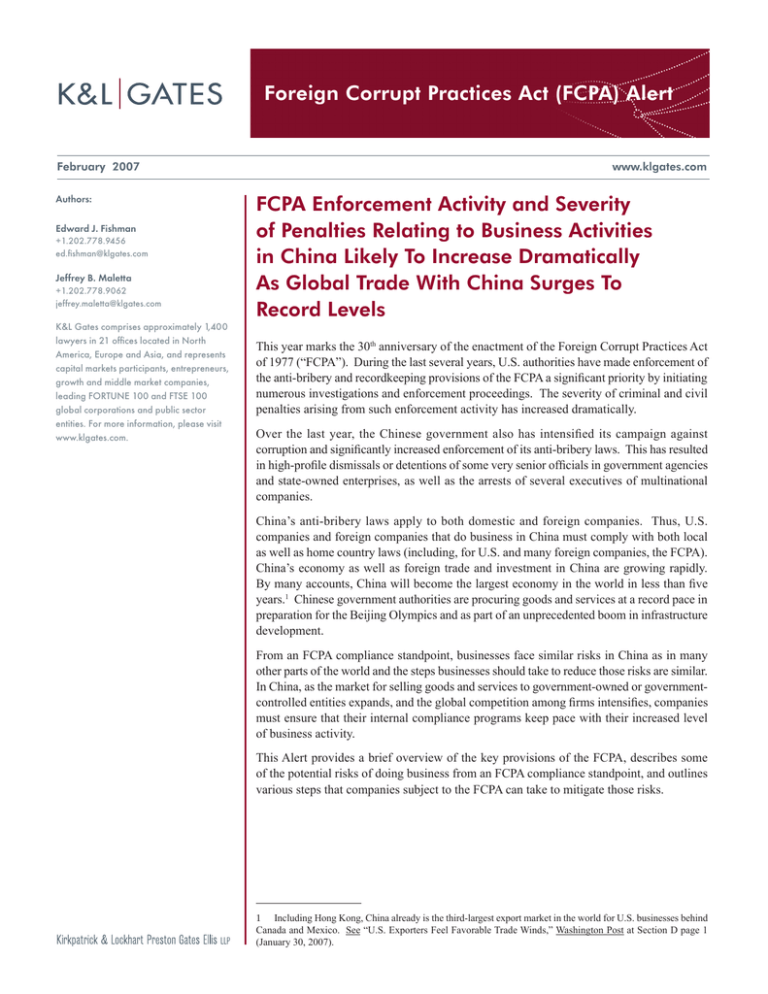
Foreign Corrupt Practices Act (FCPA) Alert
February 2007
Authors:
Edward J. Fishman
+1.202.778.9456
ed.fishman@klgates.com
Jeffrey B. Maletta
+1.202.778.9062
jeffrey.maletta@klgates.com
K&L Gates comprises approximately 1,400
lawyers in 21 offices located in North
America, Europe and Asia, and represents
capital markets participants, entrepreneurs,
growth and middle market companies,
leading FORTUNE 100 and FTSE 100
global corporations and public sector
entities. For more information, please visit
www.klgates.com.
www.klgates.com
FCPA Enforcement Activity and Severity
of Penalties Relating to Business Activities
in China Likely To Increase Dramatically
As Global Trade With China Surges To
Record Levels
This year marks the 30th anniversary of the enactment of the Foreign Corrupt Practices Act
of 1977 (“FCPA”). During the last several years, U.S. authorities have made enforcement of
the anti-bribery and recordkeeping provisions of the FCPA a significant priority by initiating
numerous investigations and enforcement proceedings. The severity of criminal and civil
penalties arising from such enforcement activity has increased dramatically.
Over the last year, the Chinese government also has intensified its campaign against
corruption and significantly increased enforcement of its anti-bribery laws. This has resulted
in high-profile dismissals or detentions of some very senior officials in government agencies
and state-owned enterprises, as well as the arrests of several executives of multinational
companies.
China’s anti-bribery laws apply to both domestic and foreign companies. Thus, U.S.
companies and foreign companies that do business in China must comply with both local
as well as home country laws (including, for U.S. and many foreign companies, the FCPA).
China’s economy as well as foreign trade and investment in China are growing rapidly.
By many accounts, China will become the largest economy in the world in less than five
years. Chinese government authorities are procuring goods and services at a record pace in
preparation for the Beijing Olympics and as part of an unprecedented boom in infrastructure
development.
From an FCPA compliance standpoint, businesses face similar risks in China as in many
other parts of the world and the steps businesses should take to reduce those risks are similar.
In China, as the market for selling goods and services to government-owned or governmentcontrolled entities expands, and the global competition among firms intensifies, companies
must ensure that their internal compliance programs keep pace with their increased level
of business activity.
This Alert provides a brief overview of the key provisions of the FCPA, describes some
of the potential risks of doing business from an FCPA compliance standpoint, and outlines
various steps that companies subject to the FCPA can take to mitigate those risks.
Including Hong Kong, China already is the third-largest export market in the world for U.S. businesses behind
Canada and Mexico. See “U.S. Exporters Feel Favorable Trade Winds,” Washington Post at Section D page 1
(January 30, 2007).
Foreign Corrupt Practices Act (FCPA) Alert
Overview of FCPA
The FCPA was enacted in 1977 following a series of
admissions that large U.S. companies paid bribes to
foreign government officials, politicians and political
parties in order to obtain or retain business. The
FCPA has two primary components -- the anti-bribery
provision enforced primarily by the U.S. Department
of Justice (“DOJ”), and the “books and records” and
“internal controls” provisions enforced primarily
by the SEC. The anti-bribery provision generally
applies to (i) any U.S. or non-U.S. company issuing
securities registered with the U.S. Securities and
Exchange Commission (“SEC”) under Section 13 of
the Securities Exchange Act of 1934 or filing reports
with the SEC under Section 15(d) of the Securities
Exchange Act of 1934 (collectively, “Issuers”), (ii)
any other entities organized under U.S. law or having
a principal place of business in the U.S., or any U.S.
citizens, nationals or residents (collectively, “Domestic
Concerns”), and (iii) any U.S. or foreign agent of the
foregoing entities. The accounting provisions of the
FCPA generally apply to Issuers, wholly-owned or
controlled subsidiaries of Issuers, and their respective
directors and officers.
FCPA Anti-Bribery Provision
The anti-bribery statute generally prohibits Issuers,
Domestic Concerns and their officers, directors,
employees and agents from corruptly offering
“anything of value” to a foreign government official,
foreign political party or candidate for foreign office to
influence an official act or secure an improper advantage
in order to obtain or retain business. An employee of a
state-owned or state-controlled corporation qualifies as
a foreign government official under the FCPA.
The anti-bribery statute contains an exception for
making small “facilitating payments” to induce
low-level foreign government officials to perform
ministerial or routine acts. For example, paying a small
sum of money to a foreign customs agent to expedite
the paperwork necessary to receive a shipment of
imported goods would most likely qualify as a
The anti-bribery provision of the FCPA also applies to any other
foreign national or entity that takes an act in the U.S. in furtherance
of a corrupt payment. See 15 U.S.C. §§78-dd-1, 78-dd2, 78-dd3.
“facilitating payment.” However, making payments to
influence a discretionary function (such as awarding a
contract for supplying goods) most likely would not
fall within the exception.
Under the vicarious liability provisions of the antibribery statute, a U.S. company or foreign issuer
may be liable for corrupt payments made by foreign
affiliates or third party agents if the company knew
or should have known of the “high probability” that
such payments were made. This standard was enacted
to prevent companies from adopting a “head in the
sand” approach regarding the activities of their foreign
affiliates and agents. The DOJ has identified a number
of “red flags” that could be sufficient to put a company
on notice of corrupt conduct by its foreign affiliates or
agents. These “red flags” include a pattern of corruption
in the country at issue, a refusal by those affiliates or
agents to provide FCPA compliance certifications,
abnormally large commissions or cash transactions with
third party agents, lack of transparency in expenses and
accounting records, and requests for payments to a
third party rather than the intermediary.
FCPA Accounting Provisions
The FCPA’s accounting provisions generally require
Issuers to maintain accurate “books and records” and to
establish and maintain an effective system of “internal
controls” to account for transactions and assets. These
requirements are designed to ensure the integrity and
transparency of financial information presented to
the investing public and to prevent and detect foreign
bribery and other improper financial activity.
The “books and records” statute requires Issuers to
maintain “books, records and accounts which, in
reasonable detail, accurately and fairly reflect the
transactions and dispositions of the assets of the issuer.”
The “internal controls” statute requires Issuers
In addition to the safe harbor for such “facilitating payments,”
it is an affirmative defense to an anti-bribery violation if the conduct
at issue was lawful under the written laws of the applicable foreign
jurisdiction.
February 2007 | Foreign Corrupt Practices Act (FCPA) Alert
to devise and maintain a system of internal accounting
controls sufficient to provide reasonable assurances that
transactions are executed and recorded as authorized
by management. The FCPA’s accounting provisions do not contain
a materiality standard, and no proof of knowledge
or intent is required to establish a civil violation.
Moreover, the SEC has the authority to enforce the
accounting provisions even if there is no jurisdictional
basis (i.e., no U.S. connection and no “red flags”)
for an anti-bribery violation. To the extent there is a
“willful” violation of the “books and records” or the
“internal controls” provision, the DOJ would have
criminal enforcement authority.
In most situations involving improper foreign
payments, the SEC typically charges a company with
violating both the “books and records” provisions
and the “internal controls” provisions of the FCPA.
The SEC takes the position that the use of funds for
a purpose other than that recorded on its books is
sufficient to support a “books and records” violation.
In other words, an improper payment to a foreign
government official that is not described as a “bribe”
on a company’s books and records is a violation (in
the SEC’s view) of the “books and records” provision
and most likely also will result in a violation of the
“internal controls” provision of the FCPA.
Penalties and Other Adverse
Consequences of FCPA Violations
A violation of the anti-bribery provision could result
in criminal fines of up to $2 million per violation for
covered U.S. and foreign companies, and criminal fines
of up to $250,000 and imprisonment for up to 5 years
per violation for covered individuals. Alternatively,
there is a statutory maximum fine equal to twice the
economic gain or loss attributable to the anti-bribery
violation.
The FCPA accounting provisions only apply to Issuers and
certain subsidiaries and affiliates. Issuers are required to ensure that
their wholly-owned subsidiaries, and any other affiliates over which
they have actual control, comply with the accounting provisions. In
addition, Issuers are required to make good faith efforts to ensure
that affiliates owned fifty percent (50%) or less comply with the
accounting provisions. See 15 U.S.C. § 78m.
See 18 U.S.C. § 3571(d).
A violation of the accounting provisions could result
in civil penalties of up to $500,000 for covered U.S.
and foreign companies and $100,000 for individuals.
Moreover, in addition to the issuance of a cease
and desist order, the SEC has the authority to order
a disgorgement of any profits (plus prejudgment
interest) attributable to the violations of the accounting
provisions. The disgorgement remedy has been a
significant and frequently used remedy in the last
few years. A “willful” violation of the accounting
provisions could result in criminal fines of up to $25
million for covered U.S. and foreign companies, and
up to $5 million and imprisonment for up to 20 years
for individuals.
In addition to the foregoing criminal and civil penalties,
an FCPA violation could have a significant negative
impact on a company’s reputation and goodwill, could
result in lawsuits from disgruntled competitors, and
could have a substantial impact on a company’s ability
to operate and expand its business through debarment
proceedings or the termination of employees involved
in the improper conduct. Moreover, a company
could be subject to multiple, parallel enforcement
proceedings in other jurisdictions under anti-corruption
laws implemented as a result of the OECD Convention
or other international regimes. Finally, a potential
merger or acquisition could be jeopardized by the
discovery of potential FCPA violations.
FCPA Risk Not Limited to U.S.
Companies
The risk of violating the FCPA is not limited to U.S.
companies. As noted above, the anti-bribery and
accounting provisions apply to any non-U.S. company
that issues securities registered with the SEC under
Section 13 of the Exchange Act of 1934 or files reports
with the SEC under Section 15(d) of the Exchange Act
of 1934. Thus, many non-U.S. companies that are
active participants in the U.S. financial markets may
be subject to FCPA requirements. In addition, any
non-U.S. company that acts in the U.S. in furtherance
of a prohibited payment scheme will be subject to the
jurisdiction of the U.S. authorities under the FCPA.
See 15 U.S.C. § 78u, u-2, u-3.
Lockheed Martin’s proposed acquisition of Titan Corporation
was scuttled after it was discovered during the due diligence phase
that Titan had engaged in potential serious violations of the FCPA.
February 2007 | Foreign Corrupt Practices Act (FCPA) Alert
A recent FCPA settlement involving Statoil, a
Norwegian oil company whose securities trade on the
New York Stock Exchange, highlights the potential
risk faced by non-U.S. companies under the FCPA.
Statoil agreed to settle parallel investigations by the
DOJ and the SEC arising out of a bribery scandal
involving an Iranian official. According to the SEC
administrative settlement order, Statoil allegedly made
approximately $5 million in payments from a U.S.
bank account to a high-level Iranian oil official through
a “consulting contract” with an offshore intermediary
company. The Iranian official allegedly helped Statoil
obtain an oil field development contract in Iran by
providing Statoil employees in Iran with copies of
bid documents from competitors and other non-public
information. The SEC also alleged that Statoil local
management concealed the true nature of the consulting
arrangement, that senior management refused to take
appropriate action to cease the improper arrangement,
and that Statoil mischaracterized the payments as
“consulting fees” in its books and records.
Statoil agreed to pay a $10.5 million criminal fine as part
of a deferred prosecution agreement with the DOJ and
also agreed to disgorge $10.5 million in alleged profits
in a parallel SEC settlement. The SEC settlement also
required Statoil to retain an independent compliance
monitor for a three-year period to review and evaluate
Statoil’s internal controls, recordkeeping and financial
reporting policies as relevant to FCPA compliance. The
compliance monitor, after developing a review plan
in consultation with DOJ and SEC staff, is required
to issue written reports of its findings and Statoil is
required to adopt any recommendations made in those
reports. This type of compliance monitor arrangements
is becoming common in FCPA settlements, even with
respect to non-U.S. companies.
The Statoil matter is significant for a number of
reasons. First, it represents the first time that U.S.
authorities have brought criminal FCPA charges against
a non-U.S. company that issues securities in the U.S.
Second, the $21 million settlement and the imposition
of a compliance monitor is one of the harshest
penalties ever imposed under the FCPA on a foreign
issuer. Third, the Statoil situation involved a criminal
See In the Matter of Statoil, ASA, SEC Administrative
Proceeding File No. 3-12453 (October 13, 2006).
Statoil was given credit for $3 million of this $10.5 million
penalty as a result of a payment it made to Norwegian criminal
authorities.
settlement with Norwegian authorities for the same
conduct. The involvement of non-U.S. jurisdictions
in the investigation and prosecution of such matters is
a trend that will continue given the recent proliferation
in anti-corruption legislation outside the U.S.
Recent FCPA Matter Involving China
In October 2006, Schnitzer Steel Industries, Inc.
(“Schnitzer”) and its Korean subsidiary entered into
a deferred prosecution agreement with the DOJ and
a settlement agreement with the SEC as a result of
alleged improper payments in China.10 Schnitzer is
an Oregon-based steel company that sells scrap metal
through its Korean subsidiary to entities in China
that are owned in whole or in part by the Chinese
government. Over a five year period, Schnitzer’s
Korean subsidiary allegedly made approximately
$200,000 in cash payments and other expensive cash
gifts (including $10,000 in gift certificates) to managers
of government-owned steel mills in China in order
to induce those mills to purchase scrap metal from
Schnitzer. According to the SEC settlement, Schnitzer
falsely described those payments in its books and
records as “sales commissions,” “refunds” or “rebates.”
The SEC also stated that, after Schnitzer’s compliance
department uncovered the improper payments, a senior
executive authorized additional payments and told
employees to increase entertainment expenses in lieu
of cash payments.
In settling the alleged violations of the anti-bribery and
accounting provisions of the FCPA, Schnitzer agreed
to disgorge to the SEC approximately $7.7 million in
profits and prejudgment interest. As part of a deferred
prosecution agreement with the DOJ, Schnitzer agreed
to retain an independent compliance monitor to
review the company’s FCPA compliance policies and
procedures for a three-year period. Schnitzer’s Korean
subsidiary also agreed to pay a $7.5 million criminal
penalty as part of a plea agreement for violating, among
other laws, the FCPA anti-bribery provisions and the
federal wire fraud statute.
The Schnitzer settlement illustrates a number of areas
for careful consideration. First, it involves alleged
payments to managers of government-owned business
enterprises in China. A similar situation arose in May
2005 in the DPC Tianjin matter, where a Chinese
10 See In the Matter of Schnitzer Steel Industries, Inc., SEC
Administrative Proceeding File No. 3-12456 (October 16, 2006).
February 2007 | Foreign Corrupt Practices Act (FCPA) Alert
subsidiary of a U.S. company was charged with
violating the FCPA anti-bribery provision as a result of
alleged payments to physicians and laboratory personnel
employed by government-owned hospitals in China.11
These cases highlight the risks of transacting business
in China from an FCPA compliance standpoint, since
many of the commercial enterprises remain wholly or
partially owned by state or local government entities.
Second, the Schnitzer settlement is noteworthy because
the settlement agreements allege that Schnitzer had
provided no FCPA training or education to any of its
employees, agents and subsidiaries. This alleged lack
of training, coupled with apparent actions by senior
company officials to authorize continued improper
payments after initiating an internal investigation,
may account for the magnitude of the total settlement
amount (approximately $15 million).
company does not have any on-the-ground presence in
China, but merely acts through third-party distributors
or other agents that may be competing for business
(and their commissions) with Chinese companies.
Potential FCPA Risks in China
Fourth, Chinese authorities recently have focused their
attention on the enforcement of China’s anti-bribery
laws. The New York Times recently reported that
more than 20 employees of several multinationals were
arrested in Shanghai on suspicion of paying bribes
to obtain business.12 In the last few years, Chinese
authorities have arrested several government officials
(including the chairman of China Construction Bank)
in connection with suspected bribery arrangements,
some of which have involved U.S. companies. The
active involvement of Chinese authorities in this area
will likely bring potential FCPA violations to the
attention of U.S. authorities through shared information
or voluntary disclosures by the companies involved.
From an FCPA compliance standpoint, many of the
potential FCPA problems are common throughout the
world, but in China businesses are more vulnerable,
largely because of the structure of the Chinese
economy. First, as mentioned above, many business
enterprises in China remain owned or controlled by
government authorities. As the Schnitzer and DPC
Tianjin settlements illustrate, the FCPA definition of a
“foreign official” extends to managers and employees
of government-owned enterprises such as hospitals or
steel mills.
Second, it is common for foreign companies operating
in China to rely on joint venture partners or local
third party agents to navigate the local market and
government approval processes. The reliance on such
partners or agents, who may not be thoroughly familiar
with the requirements of the FCPA, creates a substantial
risk that their interactions with Chinese government
officials could result in questionable payments or
other conduct that could violate the FCPA. This is a
particular concern if the U.S. or other non-Chinese
11 See In the Matter of Diagnostic Products Corporation, SEC
Administrative Proceeding File No. 3-11933 (May 20, 2005);
Department of Justice Press Release, “DPC (Tianjin) Ltd. Charged
With Violating The Foreign Corrupt Practices Act” (May 20, 2005).
These alleged payments in the amount of $1.6 million were made
to induce those employees to buy medical products and services
from DPC Tianjin, which is a wholly-owned subsidiary of a U.S.
company.
Third, it is common business practice in China to
exchange gifts with and attend social and other
entertainment events with customers and potential
customers. This is an area of major concern from an
FCPA compliance standpoint. The Schnitzer matter
allegedly involved the provision of improper gifts,
including a gift certificate worth $10,000 and watch
worth $2,400, to manager of Schnitzer’s scrap metal
customers. From a books and records standpoint, the
Chinese system of receipts (“fa piao”) results in less
detail than is customary under standard U.S. practices
and therefore heightens the FCPA risk associated with
petty cash, per diem and other payment practices.
Mitigating FCPA Risk
There are a number of steps that companies subject to
the FCPA can take to mitigate the risk of compliance
problems in connection with their operations in China
and other parts of the world. These steps include, but
are not limited to, the following:
•Strengthen FCPA Compliance Program. A
comprehensive internal compliance program
is the cornerstone of any strategy to minimize
FCPA risk. In addition to reducing the
likelihood of an FCPA violation, an
12 See “Shanghai Bribery Inquiry Ensnares Big Firms” by David
Barboza, New York Times (January 19, 2007).
February 2007 | Foreign Corrupt Practices Act (FCPA) Alert
adequate compliance program will be a
mitigating factor in assessing the culpability
of a company and its senior executives in
the event that an FCPA violation does occur.
Where feasible, the FCPA compliance policy
should be tailored to any particular risks
arising from such operations in the particular
country (including the use of third party
agents and the potential application of any
local anti-bribery laws).
•FCPA Training and Education. As noted
above, the alleged fact that Schnitzer had
no FCPA training or education for its
employees, agents and subsidiaries most
likely contributed to the severity of the
penalty imposed in that matter. A detailed
FCPA compliance policy is not very helpful
if the policy is not disseminated effectively to
and understood by all relevant employees and
third party agents, including employees and
agents in overseas locations such as China
(which may necessitate translating the policy
into Chinese or, at a minimum, holding live
training and education sessions with those
individuals).
•Due Diligence on Sales Agents and Other
Third-Party Consultants. The unsupervised
use of sales agents, tax consultants,
lobbyists, and other third party consultants
is a breeding ground for potential FCPA
problems. A company should have qualified
U.S. and foreign legal counsel review and
approve any contracts or other arrangements
with such consultants. Any such contract
should include, among other requirements,
a representation and warranty that the
consultant (i) has reviewed, understood and
agrees to comply with the company’s FCPA
policy, (ii) agrees to certify such compliance
on a regular basis, (iii) is not a foreign official
or related to a foreign official, (iv) agrees to
comply with any applicable local laws, and
(v) agrees to indemnify the company for
any breach of the foregoing representation
and warranty. Moreover, a company must
perform thorough due diligence on these
consultants through proper channels.
•Due Diligence in M&A Transactions. The
U.S. authorities take the position that
companies inherit FCPA successor liability
as a result of an M&A transaction. Thus,
potential FCPA liability should be considered
prominently in M&A due diligence activities.
This due diligence should include a thorough
review of the target company’s internal
controls, its dealings with third party agents
and consultants and any dealings with foreign
government officials.
•Appointment of Chief Compliance Officer.
One compliance technique favored by many
multinational companies is the appointment of
a Chief Compliance Officer that is responsible
for overseeing compliance with FCPA and
other ethical and corporate responsibility
issues. The Chief Compliance Officer also
may be responsible for responding to FCPA
issues reported on any confidential “hot-line”
or other reporting mechanism established by
the company to monitor compliance.
•Prompt Response to Possible FCPA
Violations. If a potential FCPA violation
comes to a company’s attention, the company
should conduct a prompt and thorough initial
investigation to determine the nature of
the potential violation, the adequacy of the
controls in place to prevent such occurrences,
and the steps necessary to remedy control
deficiencies. The investigation should be
conducted with local assistance to account for
language and other cultural issues. Decisions
must be made quickly about whether to
February 2007 | Foreign Corrupt Practices Act (FCPA) Alert
discipline any involved employees, change
any internal controls, and/or report the matter
to U.S. or foreign authorities. These are
complex strategic decisions that should be
made with the advice of experienced FCPA
and foreign local counsel.
A thorough understanding of the particular market and
industry is necessary in order to devise and implement
a workable and effective FCPA compliance policy. The
familiarity, experience and capabilities of our lawyers
in the China, Hong Kong and Taiwan markets enable
us to be of unique assistance with respect to our clients’
operations in these markets.
Conclusion
As the Chinese government market for goods and
services expands and competition intensifies, U.S.
companies and their foreign affiliates, as well as
foreign companies that issue securities registered with
the SEC, need to remain cognizant of the FCPA and
the negative impact that potential FCPA issues arising
from their activities can have on their financial health,
operational health and reputation. U.S. and foreign
companies must ensure that they take the necessary
steps to promote and monitor compliance with the
FCPA, and to respond swiftly and adequately to
potential violations, and thus avoid the possibility of
serious criminal and civil penalties.
K&L Gates comprises multiple affiliated partnerships: a limited liability partnership with the full name Kirkpatrick & Lockhart Preston Gates Ellis LLP qualified
in Delaware and maintaining offices throughout the U.S., in Berlin, and in Beijing (Kirkpatrick & Lockhart Preston Gates Ellis LLP Beijing Representative
Office); a limited liability partnership (also named Kirkpatrick & Lockhart Preston Gates Ellis LLP) incorporated in England and maintaining our London
office; a Taiwan general partnership (Kirkpatrick & Lockhart Preston Gates Ellis) which practices from our Taipei office; and a Hong Kong general
partnership (Kirkpatrick & Lockhart Preston Gates Ellis, Solicitors) which practices from our Hong Kong office. K&L Gates maintains appropriate registrations
in the jurisdictions in which its offices are located. A list of the partners in each entity is available for inspection at any K&L Gates office.
This publication/newsletter is for informational purposes and does not contain or convey legal advice. The information herein should not be used or relied
upon in regard to any particular facts or circumstances without first consulting a lawyer.
Data Protection Act 1998—We may contact you from time to time with information on Kirkpatrick & Lockhart Preston Gates Ellis LLP seminars and with our
regular newsletters, which may be of interest to you. We will not provide your details to any third parties. Please e-mail london@klgates.com if you would
prefer not to receive this information.
©1996-2007 Kirkpatrick & Lockhart Preston Gates Ellis LLP. All Rights Reserved.
February 2007 |

